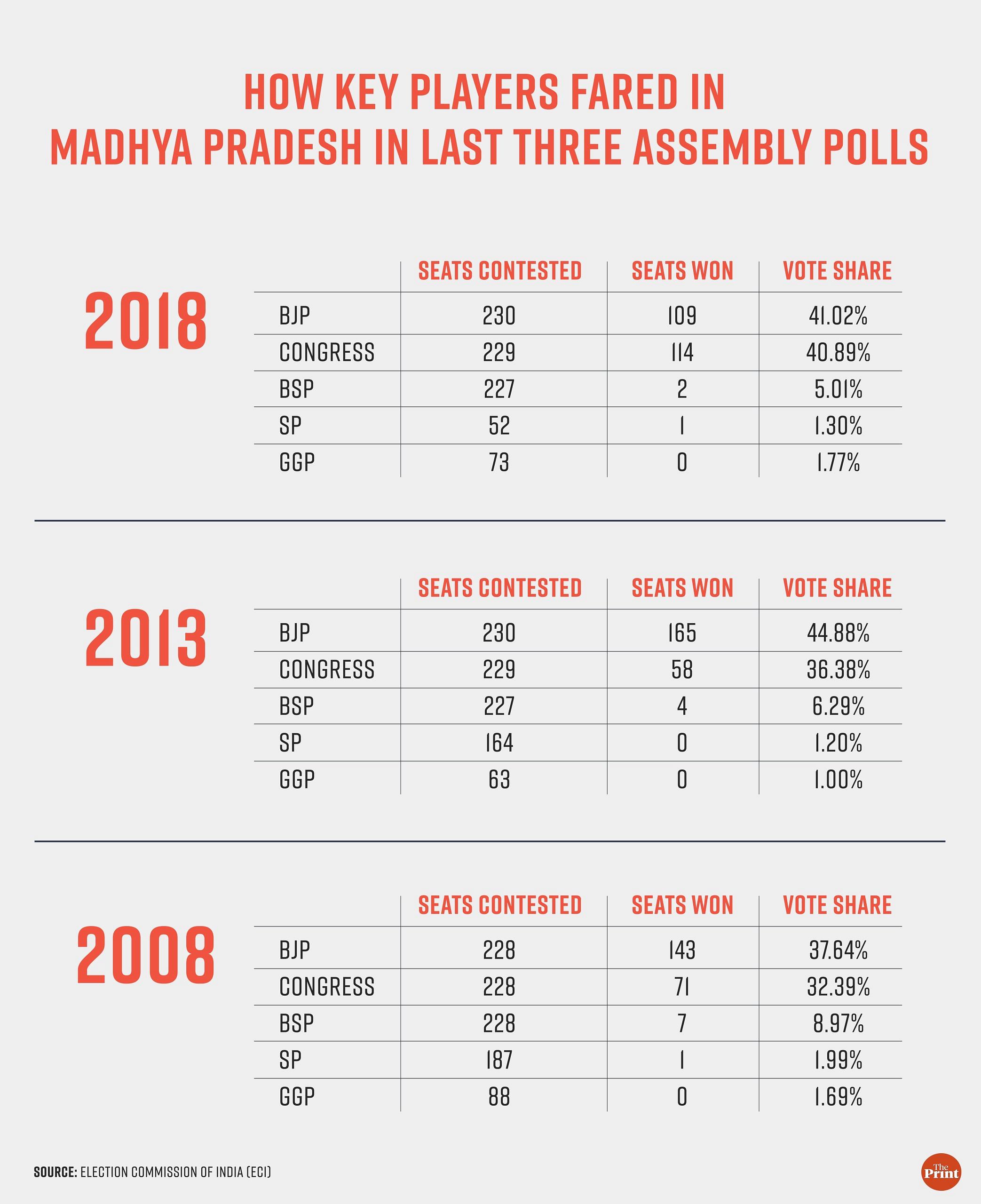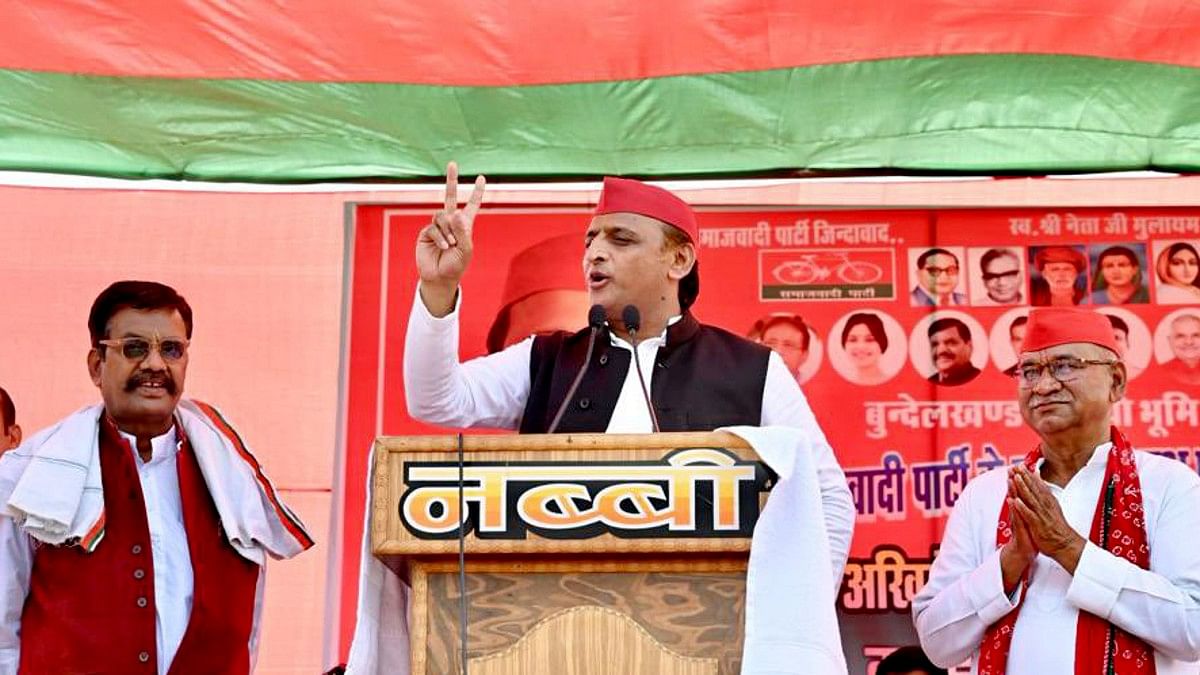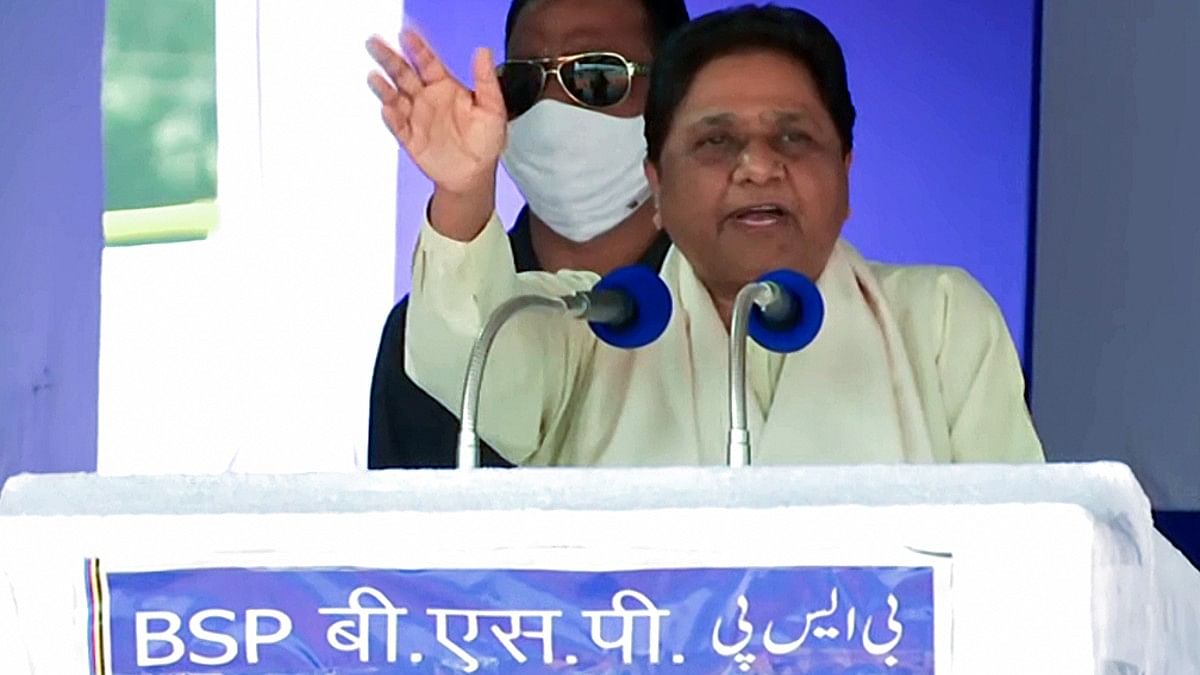New Delhi: For the Bharatiya Janata Party (BJP), the road to power in Madhya Pradesh passes through swathes of anti-incumbency sentiment and fatigue stemming from its nearly uninterrupted 18 years in power.
With most surveys by polling agencies suggesting that this bipolar electoral contest could go down to the wires, the ruling BJP is counting on the Samajwadi Party (SP), the Bahujan Samaj Party (BSP), and rebels to dent the Congress party’s prospects in multiple seats, particularly in the Vindhya, Bundelkhand, and Gwalior-Chambal regions, it is learnt.
According to party sources, in a closed-door meeting he chaired on 31 October during his three-day visit to the state, Union Home Minister Amit Shah asked state BJP leaders to help SP and BSP candidates cut into the votes of the Congress party by any means necessary.
In the 2018 assembly polls, the Congress won nine seats and lost six by a narrow margin, including many where either the SP or the BSP played spoiler. It now faces a challenge from non-BJP parties in at least 90 seats. Of these 90, the SP, BSP, or the Aam Aadmi Party (AAP) could end up dividing the anti-incumbency vote in as many as 25 seats.
Besides Vindhya and Gwalior-Chambal, Madhya Pradesh’s Bundelkhand also has seats where the SP and BSP wield some influence, despite the region as a whole showing a clear tilt towards the BJP in past elections.
In the 2018 polls, both the SP and BSP gained one seat each in the Bundelkhand region, which accounts for 26 assembly seats — including six reserved for Scheduled Castes (SCs) — spread across six districts bordering Uttar Pradesh.
The BJP had won 16 of the 26 seats in the region in 2018, while the Congress won eight. But the BJP’s tally of MLAs in Bundelkhand surged to 18 and the Congress’s came down to seven after Rajesh Shukla, the SP MLA from Bijawar, switched over to the BJP in June last year and the Congress lost the Bada Malhera seat to the BJP in a bypoll in 2020.
However, with the BJP grappling with resentment among its cadres in at least five of these 26 seats, the Congress is hoping to shore up its electoral prospects in Bundelkhand.
The Vindhya region, meanwhile, accounts for 28 assembly seats spread across six districts, namely Rewa, Satna, Shahdol, Singrouli, Sidhi and Anuppur.
At the same time, the Gwalior-Chambal region comprises eight districts — Morena, Gwalior, Bhind, Shivpuri, Sheopur, Datia, Ashoknagar, and Guna — which together account for 35 assembly seats.

“In MP, elections have largely been fought between two players, the Congress and the BJP. But SP and BSP have an impact on many seats adjoining Uttar Pradesh. Their candidates can eat into the anti-incumbency vote,” a senior state BJP leader told ThePrint.
Though adding that this “will help the BJP” since “even 500 votes” can sway the contest in multiple seats, the leader maintained that this is merely one of the several variables the party is banking on to win the elections.
Asked what these other variables were, state BJP general secretary Harishankar Khatik said the party is going to the polls by keeping “development” ushered in by Prime Minister Narendra Modi and Chief Minister Shivraj Singh Chouhan front and centre.
Also Read: Prestige battle for ‘old guard’, test of ‘revdi’ culture — 5 key trends for upcoming assembly elections
Samajwadi Party & Aam Aadmi Party
The Akhilesh Yadav-led SP and the Arvind Kejriwal-led AAP — both now allies of the Congress under the scope of the INDIA alliance — have fielded 70 and 66 candidates, respectively, in Madhya Pradesh so far.
Of the 70 candidates fielded by SP, seven are Congress rebels.
On Sunday, SP chief Akhilesh Yadav, while campaigning in Tikamgarh’s Jatara assembly constituency in Bundelkhand, called the Congress a ‘chaalu’ (cunning) party, urging voters not to vote for it. Referring to Congress rebel R.R. Bansal, who switched over to the SP and has been fielded from the Jatara seat, Akhilesh said: “Bansal ji was saddened as Congress betrayed him. If they betray me, how can they not betray you?”

Picking up on his remarks, Union Minister Rajeev Chandrasekhar said at a press conference in Bhopal, Monday, that while he did not agree with everything the SP chief said, he “agreed” with the remarks Yadav made about the Congress the previous day.
Congress leader and former CM Kamal Nath told ThePrint Monday that it was the selection of candidates and not the number of seats that led to differences with the SP.
“The problem was not about the seats, but which seats. If they demand a particular caste and that upsets our caste balance or a particular candidate who would help the BJP win, we wouldn’t agree to that because both their objective and ours is to defeat the BJP,” he said.
Though the SP was able to win only one of the 52 seats it contested in the 2018 polls, it played spoiler in a number of seats. Balaghat, Niwari, and Paraswada, to name a few, where candidates fielded by it garnered enough votes to emerge as the runners-up.
For instance, BJP’s Harishankar Khatik won the Jatara seat in 2018 on account of SP and BSP candidates cutting into the votes of the runner-up, R.R. Bansal, by securing 21,050 and 18,349 votes respectively. The BJP has now pitted Khatik against Kiran Ahirwar of the Congress from here, but SP’s Bansal could once again turn this into a triangular fight.
Though the Congress won this seat by a margin of 732 votes, Rajnagar in Chhatarpur district is another example of how SP and BSP candidates hurt the Congress’s chances by securing 23,783 and 28,972 votes, respectively.
And in Gwalior South, where the Congress won in 2018 by a paper-thin margin of 121 votes, the AAP has now prompted a three-way fight by fielding a candidate. A similar trend was observed in Jabalpur North seat, which the Congress won by a margin of 578 votes in the previous assembly elections. This time around, its candidate here is facing a stiff contest not just from the BJP but also from the SP and the Janata Dal (United).
The contest is not too different in Deotalab, where Congress rebel Seema Singh Sengar is contesting on an SP ticket. Sengar, who fought from the same seat on a BSP ticket in 2018, lost to BJP’s Girish Gautam, with Vidya Patel of the Congress finishing third.
Bahujan Samaj Party & Gondwana Gantantra Party
The BSP, which has steered clear of the 28-member INDIA alliance of opposition parties, has fielded 177 in Madhya Pradesh so far. Though it won only two of the 227 seats it contested in the state, candidates fielded by the Mayawati-led party secured second and third place in at least a dozen seats in the 2018 assembly polls.
For instance, in 2018, BJP defeated the Congress in Ater seat by a margin of 4,978 votes. In this seat, the BSP candidate came in third, having secured more than 16,000 votes.
Similarly, in Kolaras seat, where the BSP came in third with more than 16,000 votes, the Congress was trounced by the BJP by a margin of only 720 votes. And in Beena, the Congress lost to the BJP by 460 votes, while the BSP came in third with upwards of 6,000 votes. A similar trend was observed in Tikamgarh, where the BJP defeated the Congress by a margin of 4,175 votes and the BSP came in third with more than 9,000 votes in 2018.

In Pohari in Shivpuri district, sitting BJP MLA Suresh Dhakad won by defeating BSP’s Kailash Kushwah by a margin of 7,918 votes. This time around, the BSP has pitted Congress rebel Pradyuman Verma from this seat against Kushwah, who is contesting on a Congress ticket.
Meanwhile, the BSP’s ally, the Gondwana Gantantra Party (GGP) — which contested 73 seats in 2018, securing 1.77 percent of the vote — has fielded candidates on 52 of the state’s 230 assembly seats.
“The BSP has a very good presence in the Vindhya region and many strong Congress rebels are contesting on a BSP ticket this time,” Bhopal-based political analyst Girija Shankar told ThePrint.
Pointing out how BSP’s Sukhlal Kushwaha defeated Congress heavyweight Arjun Singh in Satna in the 1996 Lok Sabha polls, he added that Congress rebels can “help BJP in many seats, although only a few of them will win”.
“How both parties manage their respective rebel candidates can influence the outcome of the election. Since the BJP is facing anti-incumbency in many seats, these rebels will end up hurting the Congress” said Shankar.
The Congress has expelled 39 rebels for contesting the upcoming polls after they were denied a ticket. Of those, seven are contesting on an SP ticket, five on a BSP ticket, and 26 as Independents.
The BJP, too, has expelled 35 rebels who were denied a ticket but decided to jump into the poll fray.
Seats where a triangular fight hurt the Congress in 2018 and could end up doing the same again also include Maihar, Nagod, and Singrauli, among others.
(Edited by Amrtansh Arora)
Also Read: MP is riding on an agri boom, but there are echoes of Punjab’s Green Revolution ‘failures’

